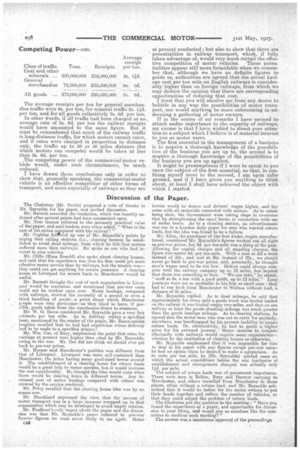Discussion o I the Paper.
Page 16

If you've noticed an error in this article please click here to report it so we can fix it.
The Chairman (Mr. Swain) proposed a vote of thanks to Mr. Reynolds for his paper, and invited discussion. Mr: Barnett seconded the resolution, which was heartily endorsed after several points had been commented upon. Mr. Torn Garner referred to the intensely practical value of the paper, and said traders were often aslosd, "What is the cost of the motor compared with the railway ? " Mr. Coghlan folltwed up one of Mr. Reynolds's points by urging that calling stations (i.e., clearing houses) be established to avoid dead mileage, from which he felt that motors suffered more than railways. He spoke as one who had in terest in nine vehicles. • Mr. Cliffe (Hans Renold) also spoke about clearing houses, and said that his experience was that his firm could get more effective motor service than by railways, but the trouble was— they could not get anything for return journeys. A clearing house at Liverpool for return loads to Manchester would be useful.
Mr. Barnett thought the cost of such organization in Liverpool would be enormous, and mentioned that pre-war costs could not he worked upon now Motor haulage' compared with railways, averted the necessity a a second or even a third handling of goods—a point about which Manchester pcople were very particular—as they liked to have, if pos. sible, goods taken from the warehouses direct to.steamers.
Mr. W. G. Reece considered Mr. Reynolds gave a very fair estimate per ton mile. As to delivery within a specified hour, mentioned by the Deader of the paper, Mr. Reece amidst laughter recalled that he had had experience where delivery had to be made to a specified minute ! Mr. Wm. Gee, of Bury, emphasized the point that rates for carriage at present were higher than cited by Mr. Reynolds, owing to the war. Mr. Gee did not think we should ever get back to pre-war prices.
Mr. Harper said Manchester's position was different from that of Liverpool. Liverpool was more self-contained than Manchester, the latter having many good-sized towns around it. The establishment of a clearing house for tetnrn loads weuld be a. great help to motor carriers, but it would increase the cost considerably. He thought the time would costa when there would be clearing bases in different towns. Any increased cost of motor haulage compared with others was covered by the service rendered. Mr. Percy recalled that the clearing house idea was by no means new.
Mr. Shankland expressed the view that the success of motor transport was in a large measure wrapped up in that organization which may be developed to avoid empty returns.
Mr. Faulkner's only regret about the paper and the discussion was that Mr. Reynolds's paper referred to pre-war figures—figures we were, never likely to see again. Motor
C411 lorries would be dearer and drivers' wages high-er, and the same with all materials connected with motors. As to canals being slow, the Government were taking steps to overcome that by ,strengthening the canal banks in connection with use of motor boats. As to a clearing station, an advertisement was run in a -London daily paper for men who wanted return loads, but the idea was found to be a failure.
Mr. Allen, the purchaser of the first Foden wagon manufactured, considered Mr. Reynolds's figures worked out all right as pre-war prices, but 3d. per ton-mile, was a thing of the past. Allowing for capital charges and all standing charges, the figure was nearer Cal. per ton-mile. With a man at £3 a week instead of 32s., and coal at 38s. instead of 22s., we should never go back to pre-war prices, and, personally, be thought men's wages used to be too low. Motors could always compete with the railway company up to 13 miles, but beyond that there was something to face. "We can take," he stated, "stuff at 3& a tan with a good profit, up to 12 miles." Long journeys were not so profitable to his firm as short ones : they had to run back from Manchester to Widnes without load, a distance of 31 miles.
Mr. Reynolds replied. As to dead mileage, he said that approximately for every mile a goods truck was hauled loaded on the railway it, was hauled empty two miles, and that on one railway at least the goods shunting mileage was much greater than the goods haulage mileage. As to,clearing stations ho agreed that the motor man who was out to carry for anybody, anywhere, was handicapped by his present inability to secure return loads. Or, alternatively, he had to quote a higher price for his outward journey. Motor carriers to compete effectually with railways would require sonic organization— whether by the institution of clearing houses or otherwise.
Mr. Reynolds emphasized that it was impossible tar him to deal in his paper Aith any figures except pre-war rateac he had no option when be desired to make a comparison. As to costs per ton mile, he (Mr. Reynolds) quoted cases on which the actual expenditure before the war (exclusive of establishment and management charges) was actually only lid. per mile. The subject of return loads was of paramount importance. There were men in Bolton, Bury and Damen carrying to Manchester, and others travelled from Manchester to those places, often without a return load, and Mr. Reynolds submitted that it would be better for the meter owners to put their heads together and reduce the number of vehicles, so that they could adjust the problem of return loads, The Chairman put the question to the meeting : " Have you found the experiment of a paper, and opportunity for discussion to your liking, and would you as members like the committee to continue such meeting?"
The answer was a unanimous approval of the proceedings.






















